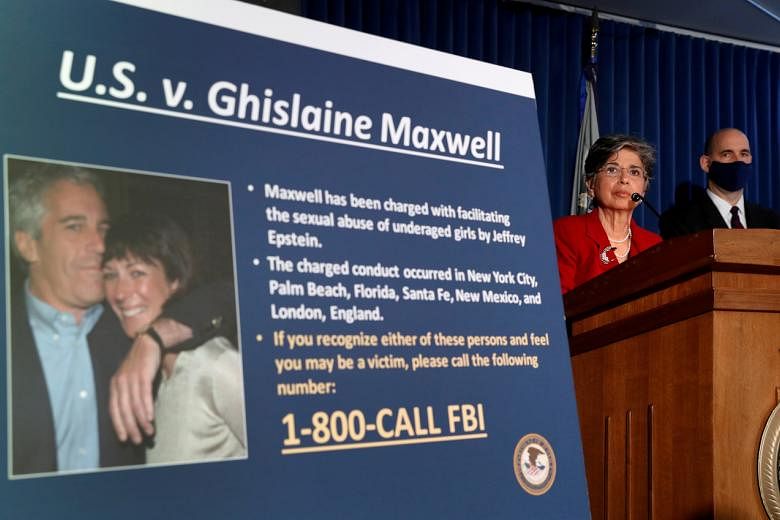NEW YORK (NYTIMES) - Ghislaine Maxwell, the British socialite and longtime companion of Jeffrey Epstein who is charged with contributing to his abuse of teenage girls more than two decades ago, was again denied bail by a federal judge on Monday (Dec 28).
The ruling came in response to a US$28.5 million (S$37.8 million) bail proposal that Maxwell offered this month. It would have released her from what her lawyers called the "intolerable" conditions in jail and into house arrest at a friend's New York City home.
Maxwell was first denied bail after her arrest in July.
The latest bail request, Maxwell's lawyers wrote in a court filing, reflected "all of her and her spouse's assets, her family's livelihood and the financial security of her closest friends and family." They argued that she was not a risk to flee and said they would hire private security guards to ensure that she did not.
As they did in fighting Maxwell's original bail application, federal prosecutors argued in court filings opposing her latest request that she remained "an extreme flight risk" and should stay in jail.
The judge who issued the ruling Monday, Alison J. Nathan of US District Court in Manhattan, concurred.
The government, she wrote, had "met its burden of persuasion that the defendant poses a flight risk." Nathan had also rejected Maxwell's earlier bail request, which was based on the offer of a US$5 million bond.
Bobbi C. Sternheim, a lawyer for Maxwell, did not immediately respond to a request for comment.
Maxwell, 59, faces six counts that include transportation of a minor with intent to engage in criminal sexual activity and perjury. She has pleaded not guilty and is being held at the Metropolitan Detention Centre, a federal jail in Brooklyn. If convicted, prosecutors have said, she could be sentenced to up to 35 years in prison.
In announcing the charges against her in July, Audrey Strauss, the top federal prosecutor in Manhattan, said that Maxwell had "enticed minor girls, got them to trust her, then delivered them into the trap" that she and Epstein "had set for them."
Epstein, 66, was found dead in August 2019 after he hanged himself in his cell at the Metropolitan Correctional Centre, a federal jail in Lower Manhattan. He had been arrested on sex trafficking charges a month earlier.
After Epstein's death and before Maxwell was arrested, she hid for months in a home in New Hampshire, which prosecutors, as part of their opposition to her initial request for bail, cited as evidence for her effort to elude law enforcement.
At the time, prosecutors noted that she had passports from three countries, and investigators said they had identified more than 15 bank accounts linked to her, with balances that totalled more than US$20 million at times.
From 2007 to 2011, prosecutors said, more than US$20 million had been moved from accounts associated with Epstein to accounts associated with Maxwell. The government called her total financial picture "opaque and indeterminate."
Of her stay at the New Hampshire home, her lawyers said Maxwell, once a fixture of New York's social scene, had simply been trying to avoid reporters and had no plans to flee from the authorities. They repeated that argument this month.
"Ms Maxwell vehemently maintains her innocence and is committed to defending herself," her lawyers wrote in their latest bail request.
"She wants nothing more than to remain in this country to fight the allegations against her." That desire notwithstanding, the lawyers wrote, Maxwell found the conditions of her confinement in the Brooklyn jail oppressive.
Guards with flashlights roused her every 15 minutes to check whether she was breathing, the lawyers wrote. She was strip-searched regularly and subjected to nonstop surveillance. In a cell isolated from other prisoners, she had been deprived of food and sleep and was unable to communicate with friends or family, her lawyers asserted.
In arguing against her release to home confinement, federal prosecutors contended that Maxwell did not have it so bad. She is released from her cell for 13 hours a day, has her own shower, phone and exclusive use of two computers - and even her own television, they wrote.
"Those conditions set her far apart from general population inmates," prosecutors wrote, "not to mention other inmates in protective custody." Prosecutors also sought to refute claims by Maxwell's lawyers that the evidence against her was not as strong as the government had indicated.
Hinting at how a trial might unfold, prosecutors wrote that in their filing opposing the latest bail request that three victims were prepared to provide detailed testimony about Maxwell's role "in Epstein's criminal scheme to sexually abuse them as minors."
Each of the victims, prosecutors wrote, would explain in court how "the presence of an adult woman manipulated her into entering an abusive situation." Each, they added, would also describe how Maxwell befriended them, expressed an interest in their lives and then normalised abusive sexual behaviour by Epstein.
The "evidence confirms that the government's case remains as strong as it was at the time of the defendant's arrest," prosecutors wrote.

